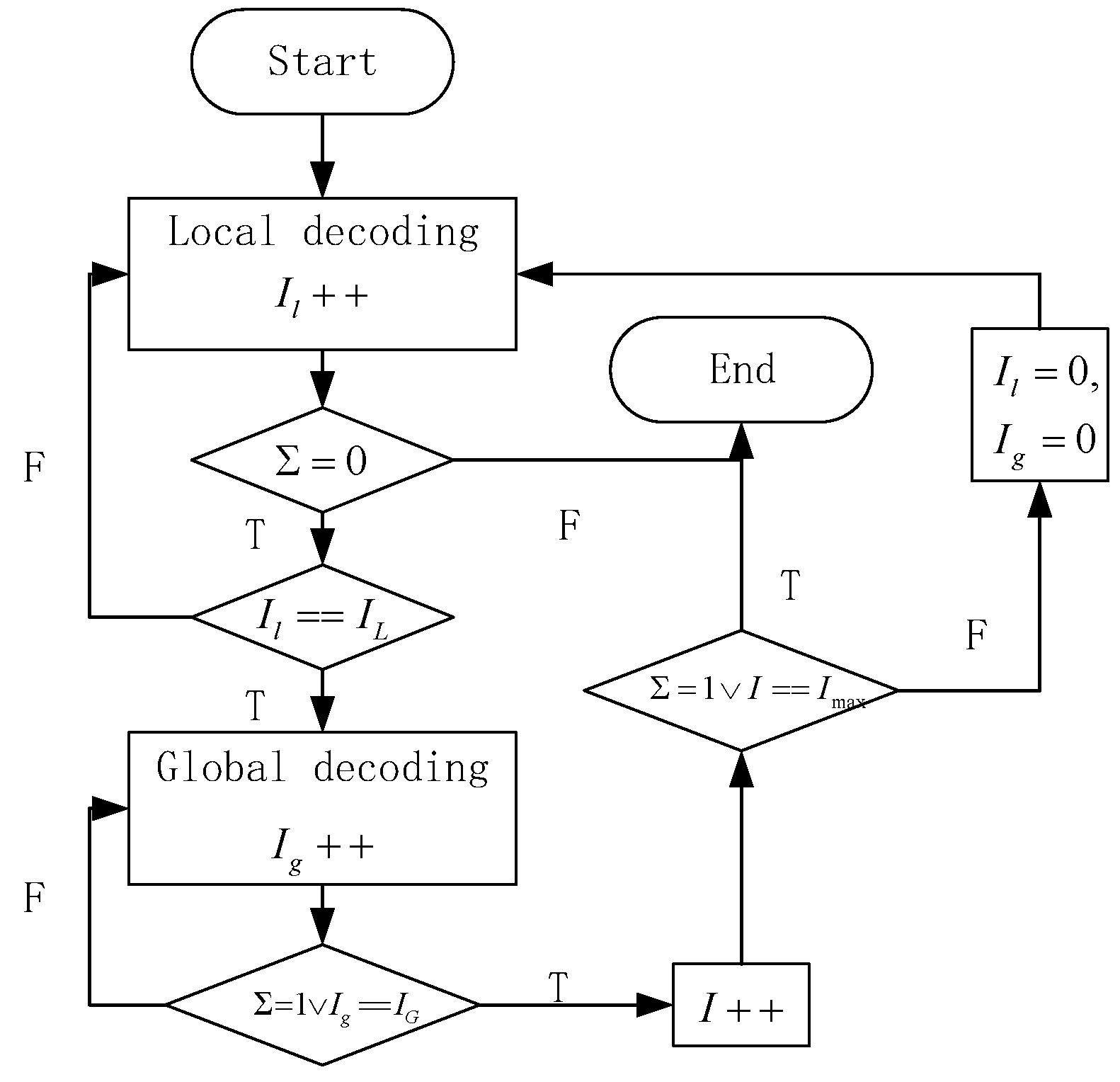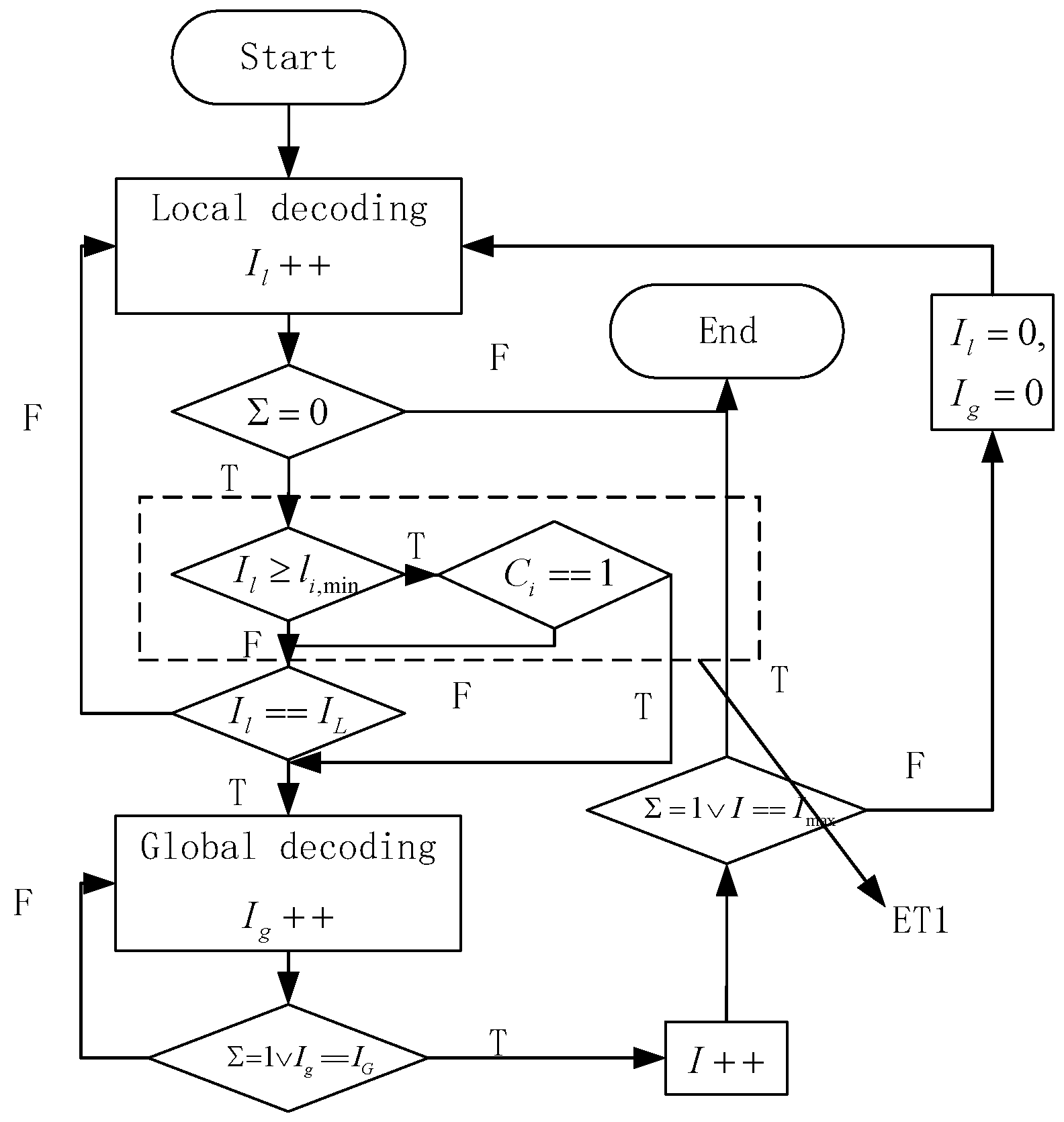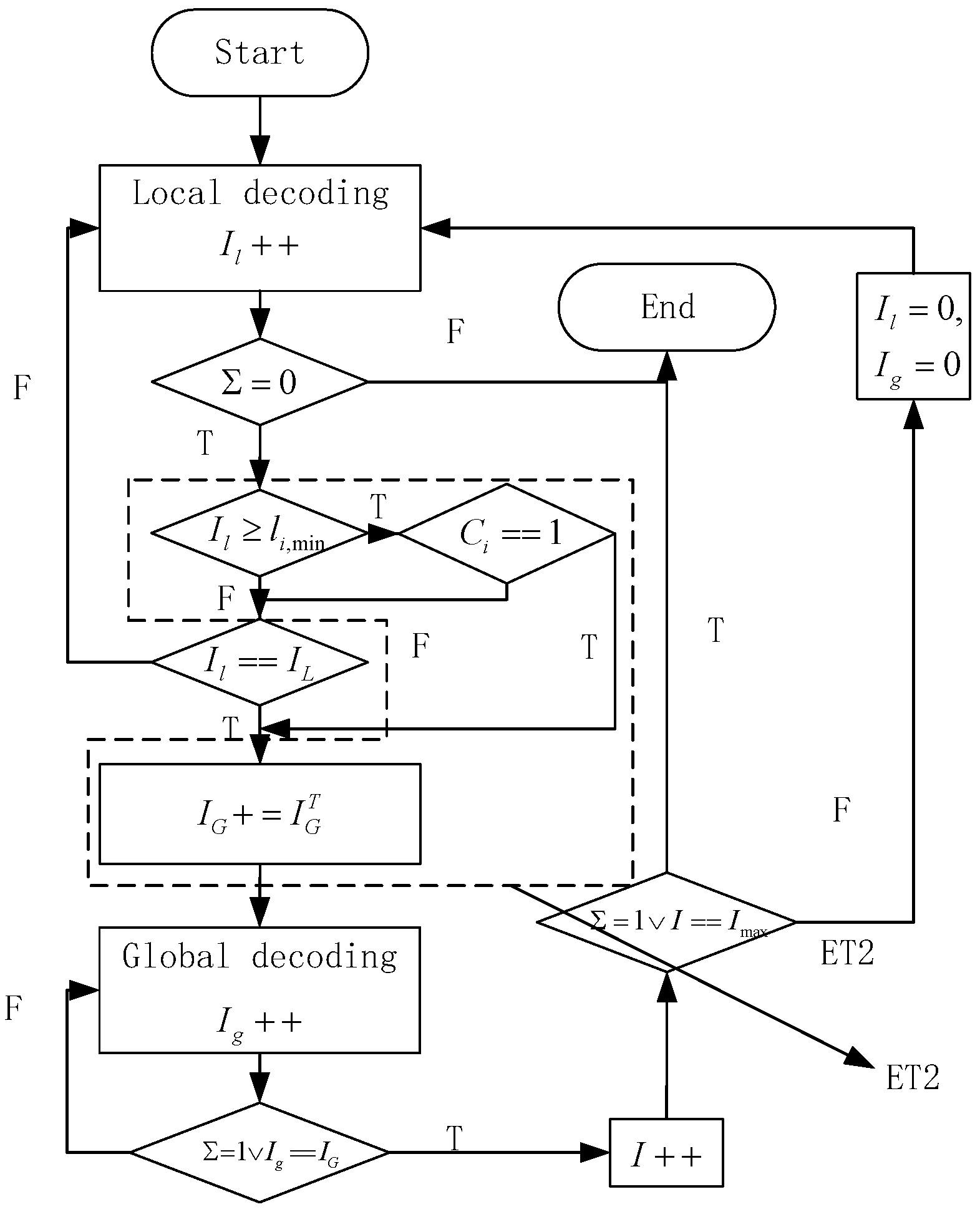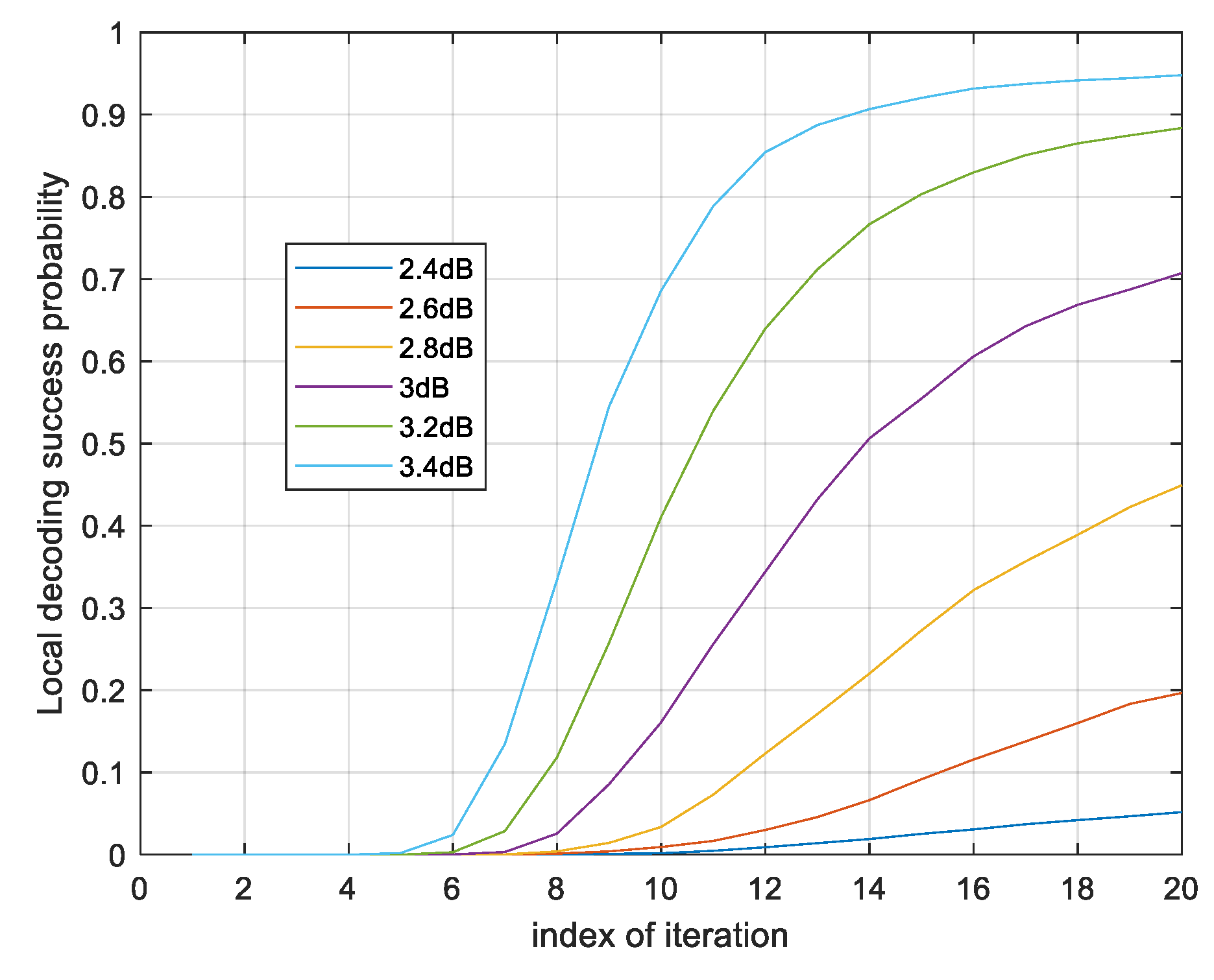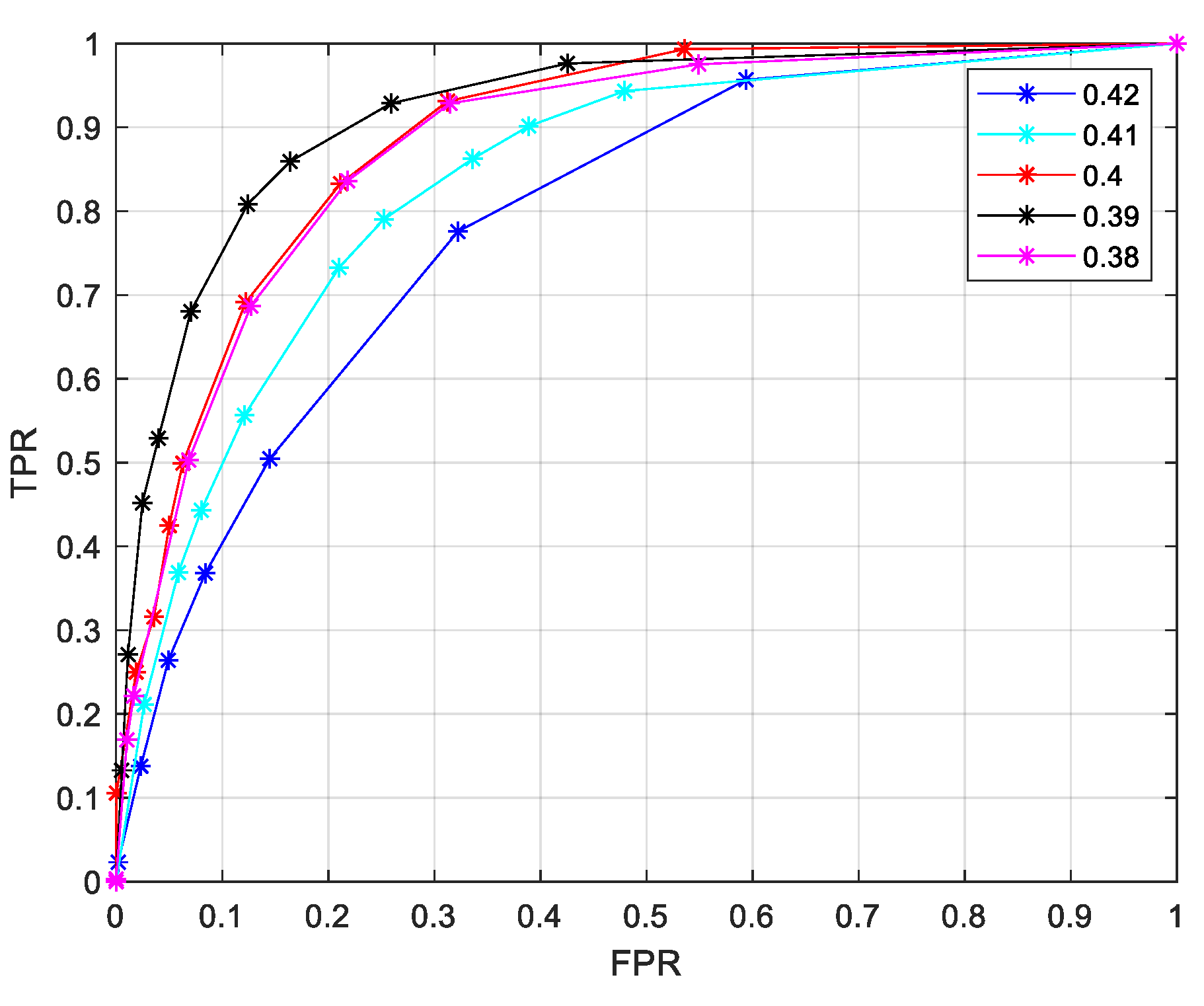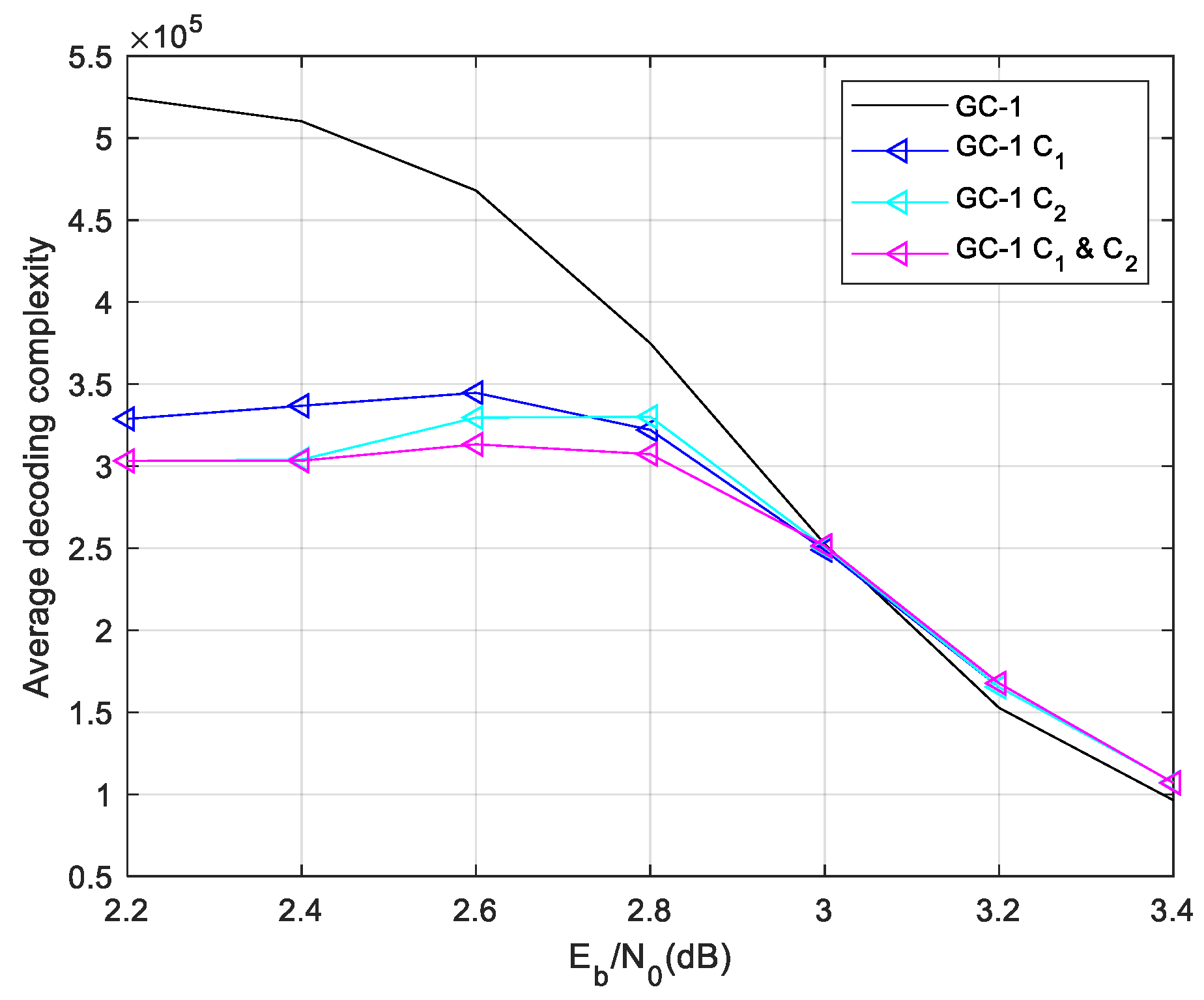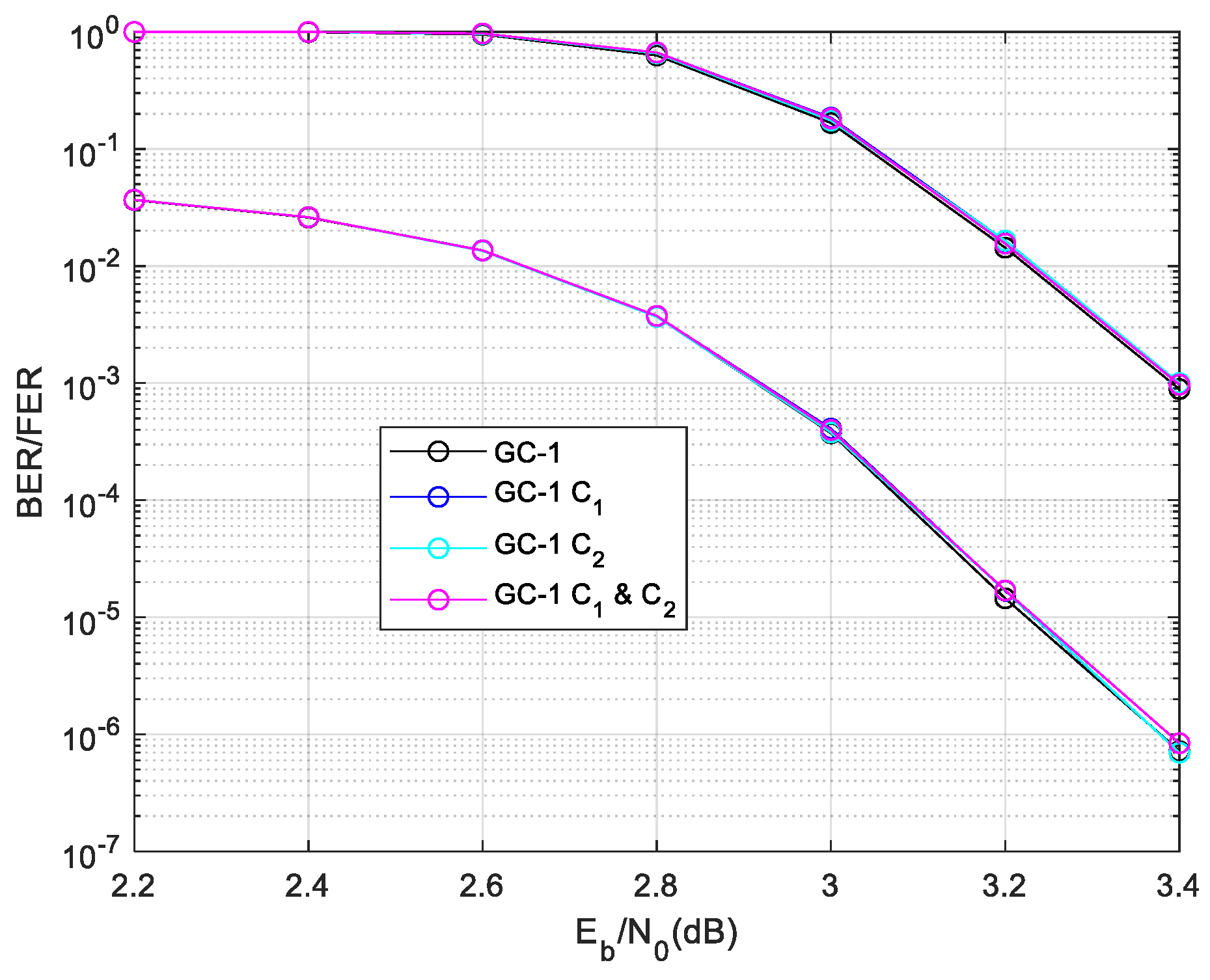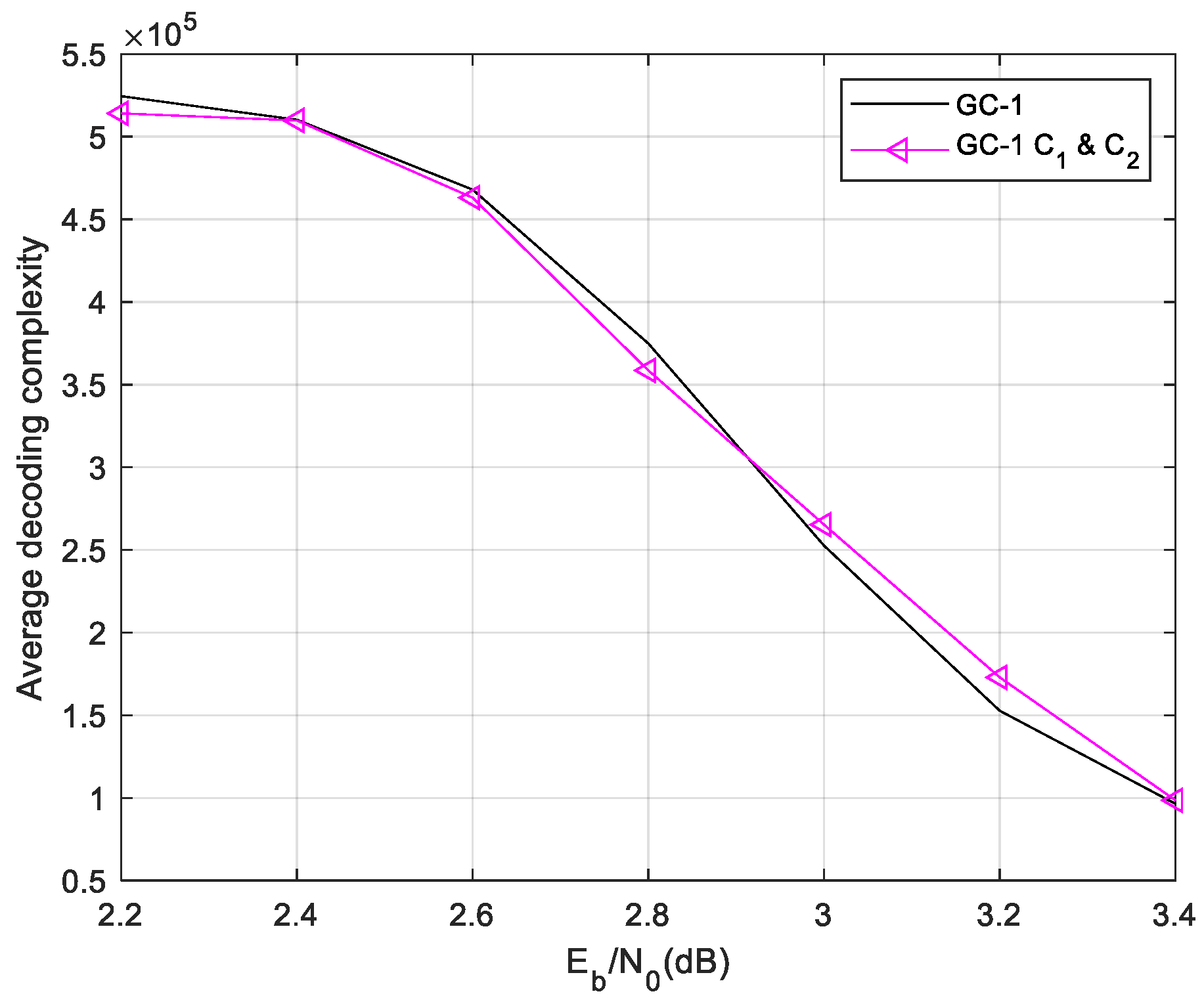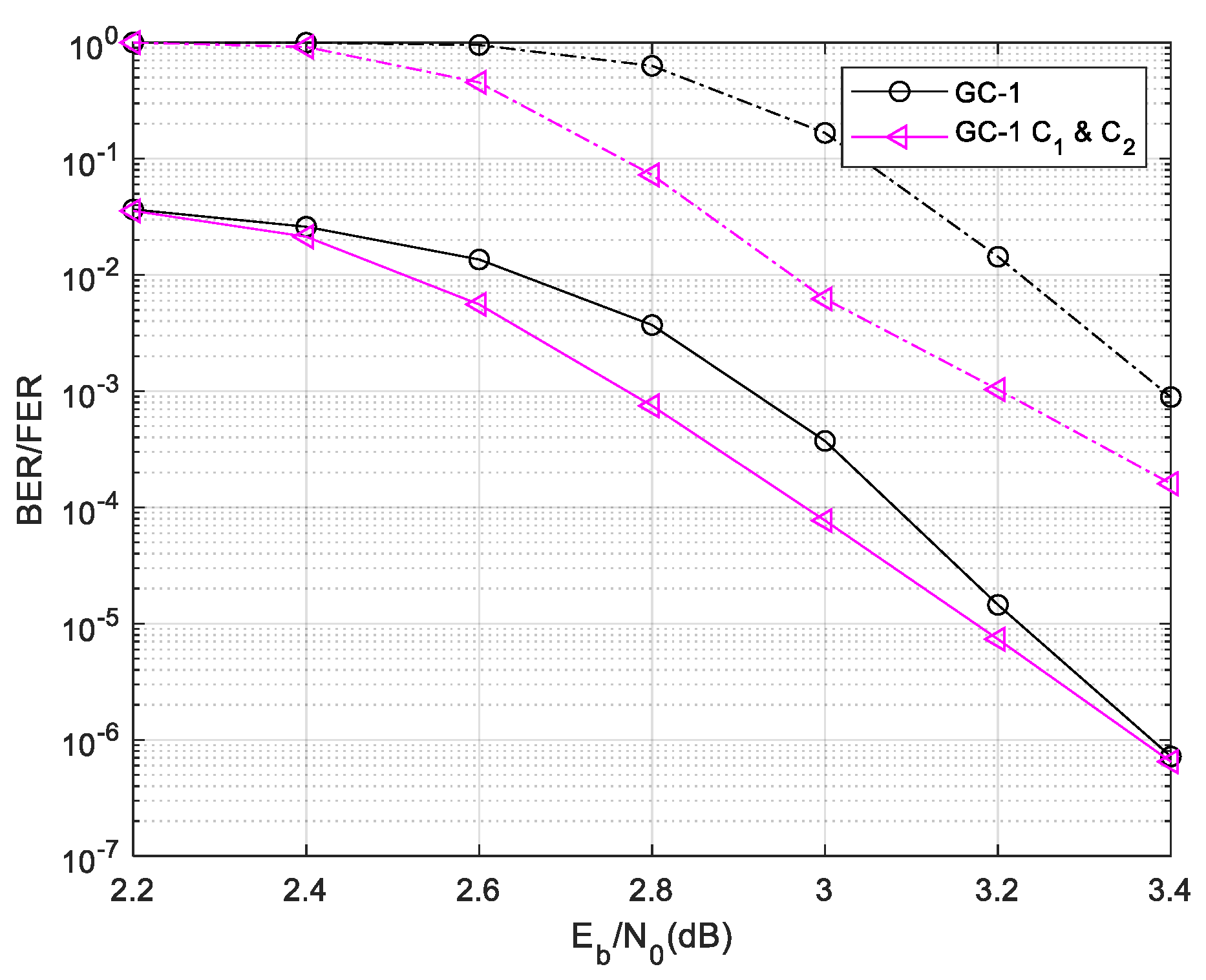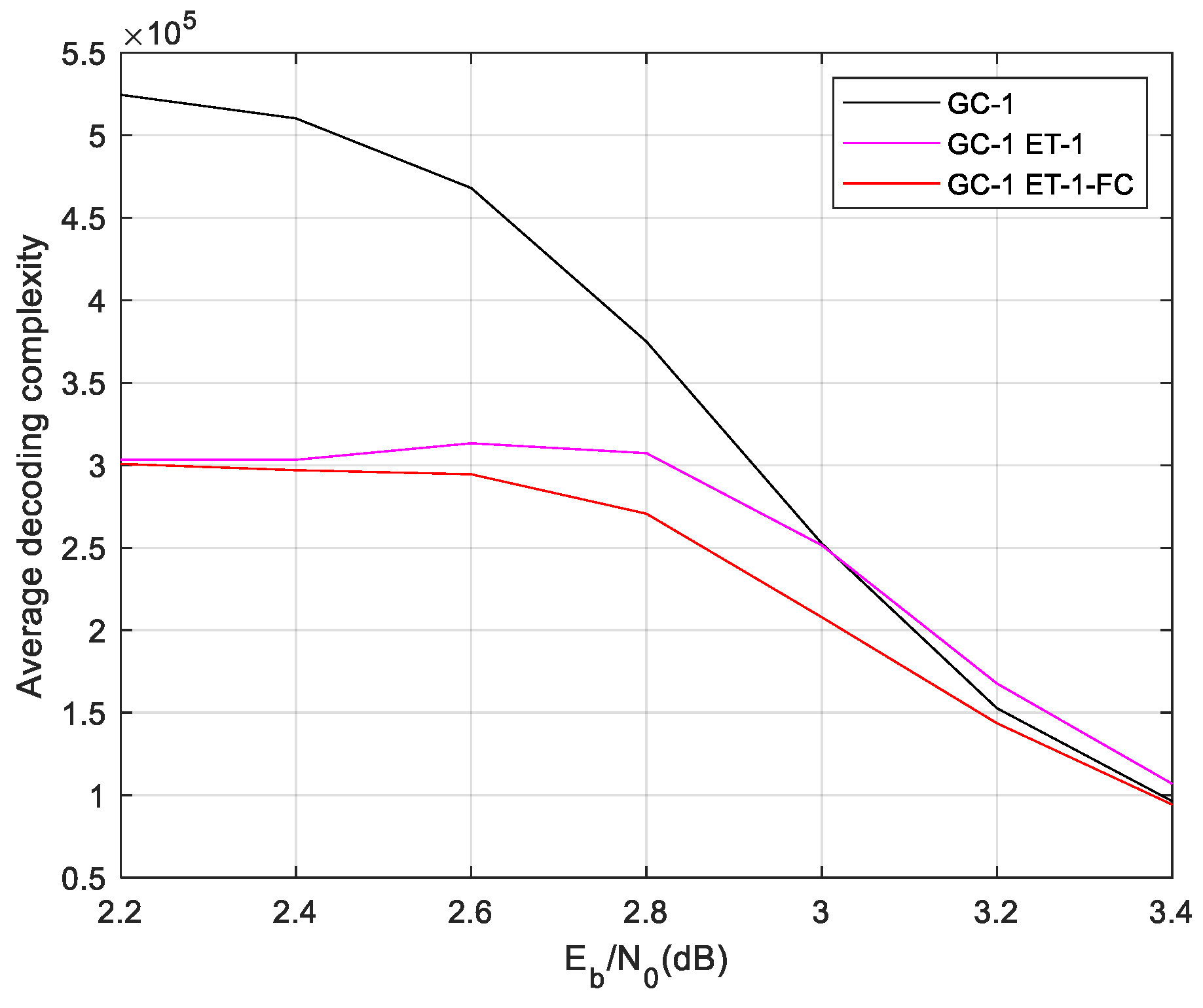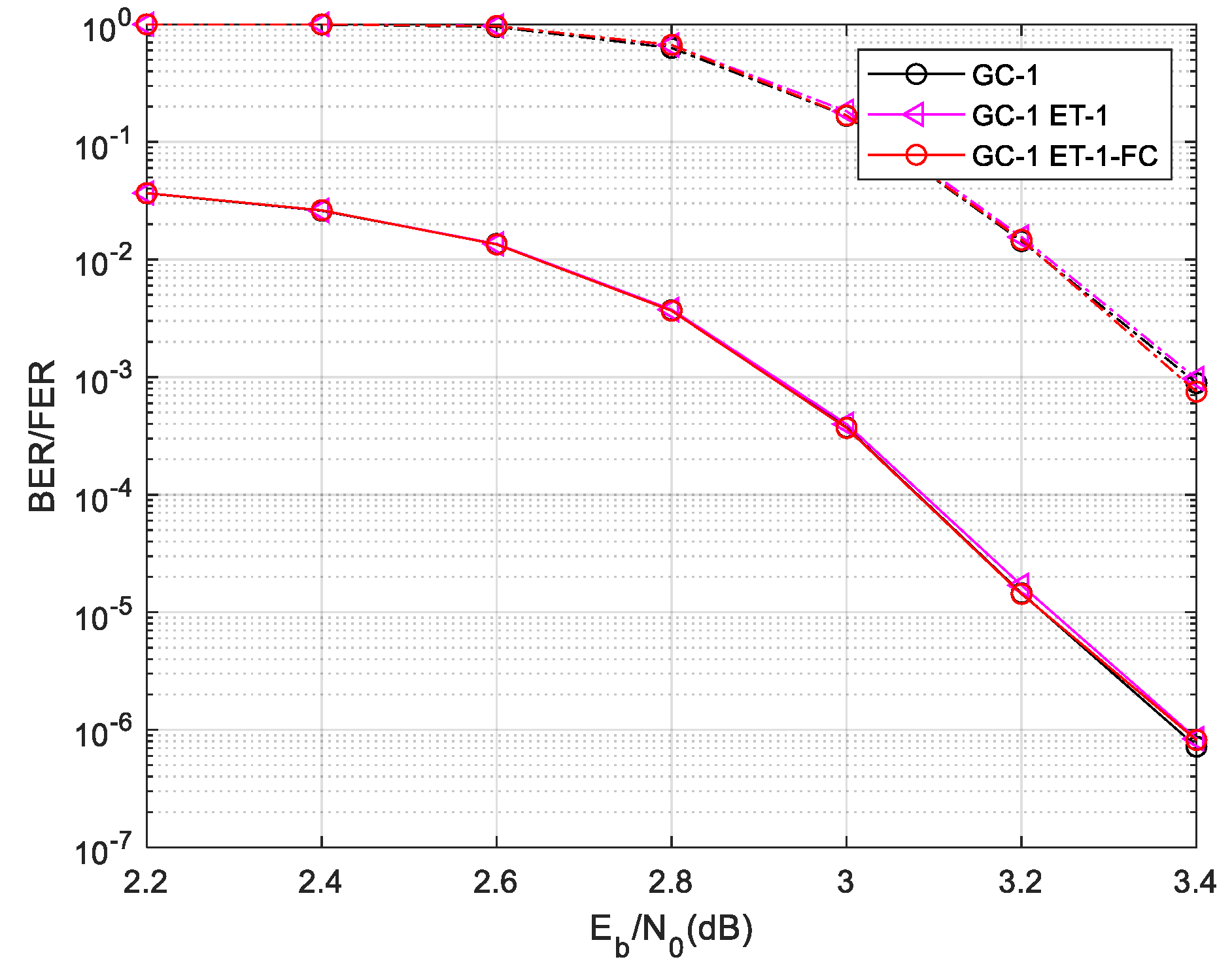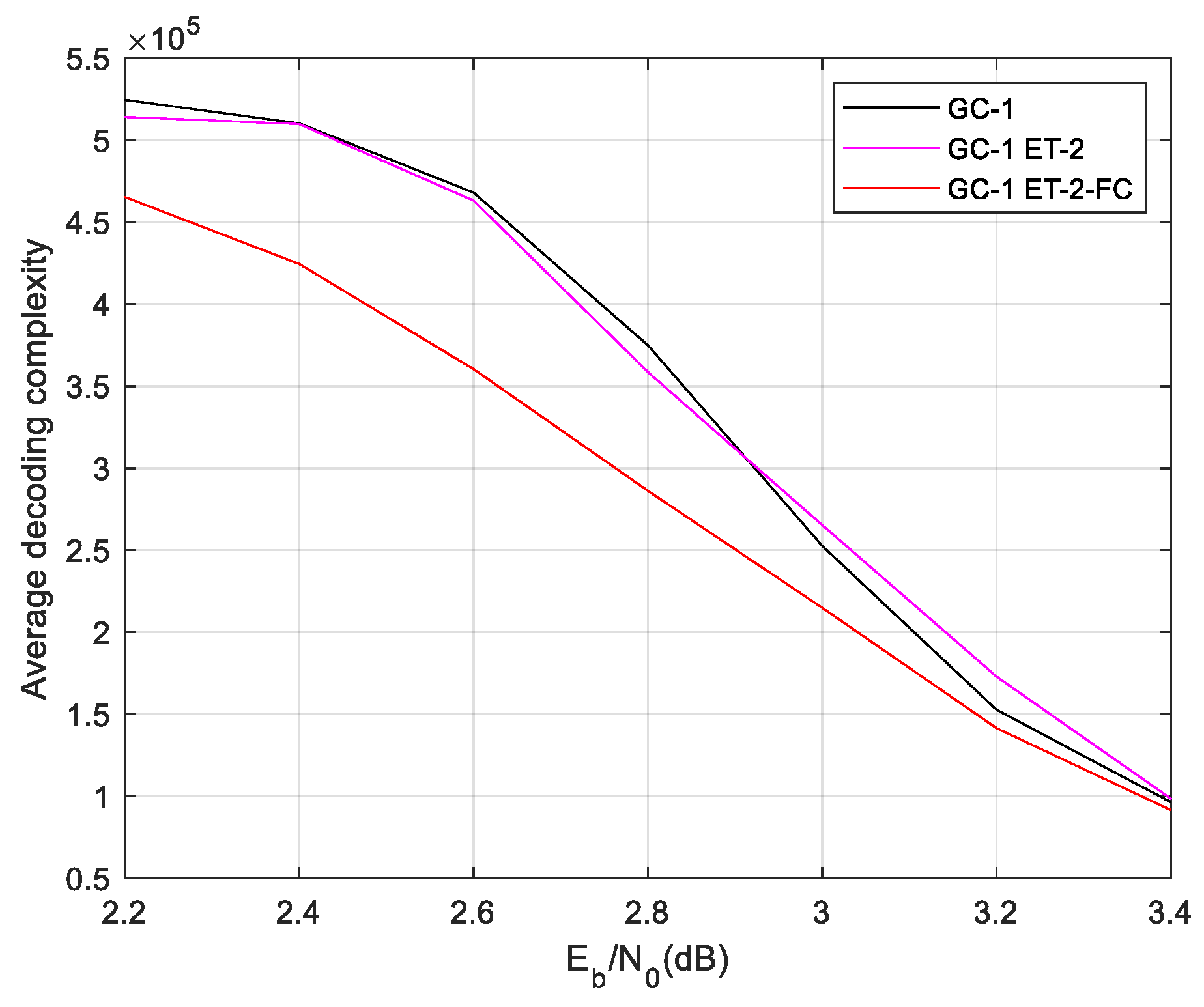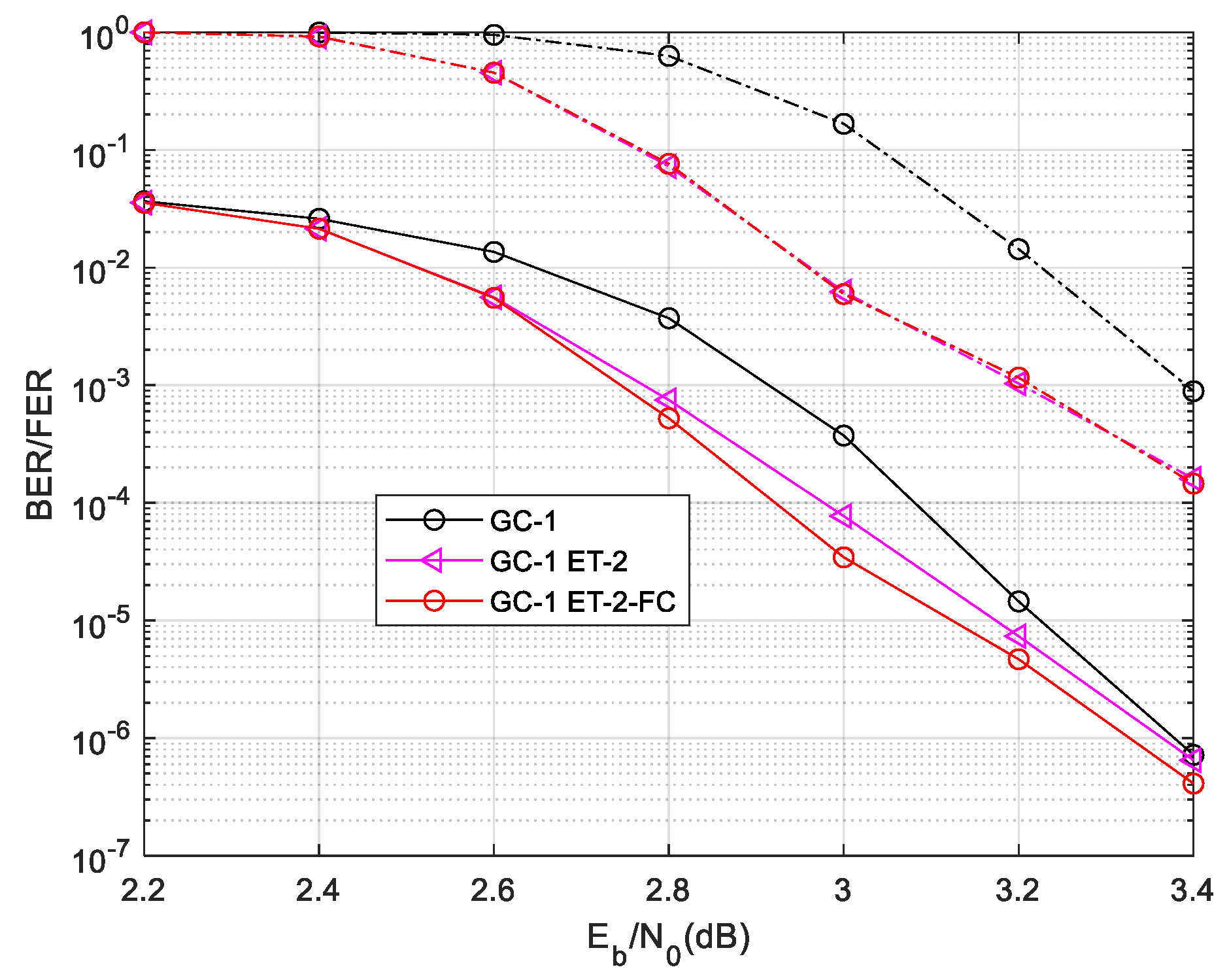1. Introduction
In recently years, the Globally-Coupled (GC) Low-Density-Parity-Check (LDPC) code attracts the many attention for its special structure and decoding algorithm [
1,
2,
3,
4]. This code performs well in both AWGNC and BEC. The GC-LDPC code consists of several individual local LDPC codes and the global coupling part. The global coupling part connects these local codes, enlarging the size of the code and improving connectivity. These local codes can be decoding individually, which is called local phase decoding. If the local decoding cannot makes the local codes convergence, the global decoding should step in the final decoding process. This kind of decoding algorithm is called local/gloabl two-phases decoding[
1]. Thanks to the two-phases decoding algorhtm, the decoding time delay can be reduced by parallel local decoding. In the hardware implement, the GC-LDPC code leads the system more efficient and larger throughput [
5,
6,
7]. In MIMO system, GC-LDPC code improves throughput by 4 and 5 times for code rates of 0.49 and 0.66[
8]. To make GC-LDPC code design more flexible, many paper provide several constructions[
9,
10,
11,
12,
13]. To design the GC-LDPC code with better performance, [
14] gives the protograph-based construction by P-Extrinsic Information Transfer (EXIT) chart, performs better than previous GC-LDPC code, converts the general global coupling part to the tail-biting structure can also improve the code’s performance[
15]. The free-ride code is utilized as the implicit global coupling part [
16]. This kind of GC-LDPC code gets same code rate as the local codes, and gets more than 0.8dB gain than the local codes. In most cases, finite fields or finite geometry is used to build the QC-GC-LDPC code, and the girth is limited to 6. The short cycles always produce the trapping sets, which leads the
phenomenon to LDPC codes with the
decoding[
17]. The girth of GC-LDPC code is extended from 6 to 8 with Greatest Common Divisor (GCD) criterion[
18].
The Early Termination (ET) algorithm is the conventional method to save the decoding complexity[
19,
20,
21,
22,
23,
24]. The ET technology is consisted by Early Give Up (EGU) and Early Success (ES)[
22]. The main propose of EGU is stopping the nonconvergent code early to save the decoding complexity. The ES stops the decoding process if it is converged to a valid result. The method of determining whether the code converges is very important, which decides the final performance of the code. [
21,
22] study the decision theory of ET. The Receiver Operating Characteristic (ROC) curve is a useful tool to analyze the sensitivity of detector to build a accuracy judge condition [
22].
Same as ET, the Force Convergence (FC) algorithm is utilized as a conventional method to save decoding complexity[
25,
26,
27,
28,
29,
30]. By monitoring the nodes in real time, FC determines the node satisfying the convergence condition in advance and removes the node in the rest iterations. In most cases, the amplitude of each node is utilized to judge the reliability.
This paper firstly adopted the ET algorithm into the local phase decoding. The proposed ET-1 decoding scheme saves decoding time complexity compared with the conventional two- phases decoding scheme in low SNR region, without performance degradation. The ET-2 decoding scheme improves the code’s performance with the same decoding time complexity with the conventional two-phases decoding. Then, the FC scheme is used to the global phase decoding to further save the decoding time complexity. In the ET-1-FC decoding algorithm, the FC scheme saves more time complexity in the waterfall region, with the same final performance as other decoding algorithm. The ET-2-FC decoding algorithm improves 1.8dB in waterfall region in BER and 2.3dB in FER. Meanwhile, in this algorithm, the FC scheme saves decoding time complexity in the waterfall region.
2. GC-LDPC Code
Let the GC-LDPC code is consisted by
t local codes
, and the global coupling part is
.The general structure of GC-LDPC code is shown as equation (
1).
In this paper, we consider with same size. Setting n as the code length of , the local code length is . The global coupling part make the global code rate is lower than the local code rate .
2.1. Construct Method
The main construction idea of GC-LDPC code is to form the code structure by deformation of the matrix with good girth. Therefore, the design method of the matrix is the most important step in the construction process.
The first construction method of GC-LDPC code is based on finite fields. Let
be a prime element in GF
. The non-zero elements in GF
constitute the sequence
,
. A
cyclic matrix
can be constructed from this cyclic sequence [
1]:
Any two rows
and two columns
can be related to a
a sub-matrix
. At the same time, a matrix
satisfy the
-SM constraint can be constructed as
The method based on RS (Reed-Solomn) code can also design GC-LDPC code with girth of at least 6[
10,
12]. This code has remarkable performance for correcting random errors, random short phased bursts of erasures and long bursts of erasures. Let
be the prime factor of GF
. If
is not a prime number and
n is a factor of it,
. Let
, there is an
n ordered sequence
, called the multiplicative group of GF
. Take
as the root to get the following matrix,
Let
be the smallest prime factor of
n and
d be a positive integer less than or equal to
,
. When
,
primitive RS code, otherwise it is nonprimitive RS code, and
is a matrix that satisfies the
-SM constraint. Now, the matrix (
1) can be constructed by
,
or
through PEM (partition, edge-spreading, mask) operations. A special design scheme is proposed in [
13], namely the RS-liked construction method. In this scheme, the local code and the global part can be designed independently. The RS-liked construction method simplifies the search for design parameters in algebraic construction, making it easier to determine parameters such as
p and the
t. This construction method can be based on any GF
,
is prime, breaking the traditional RS code based on GF
setting. Local code set
global part for
.
This design can flexibly design local codes of different sizes. Suppose you want to construct two different size of local code and . Decomposing as . Constructed of two local codes respectively and , The global part is RS code . ,, and .
The previous construction methods can only ensure the girth 6 for GC-LDPC code. In [
18], we propose the GCD-based construction method to rasie the girth to 8. The
GCD-based full-length row multiplier (FLRM) matrix is :
where
, and
are integers with
and
. Each
is exponential factor for
sized CPM. The row coefficient vector is
, and in common way the column coefficients vector is
. In conventional GCD-based LDPC code, the minimum bound of
P is
. We discover the new lower bound of the GCD-FLRM to make the design of GC-GCD-LDPC code more flexible[
31]. For the GC-GCD-LDPC code have better performance than other kinds, this paper takes GC-GCD-LDPC code as the main analysis object.
2.2. Local/Global Two-Phases Decoding
The local/global two-phases decoding scheme is the most interest characteristic of GC-LDPC code. Each bit in the codeword belongs to the local code as well as the global code. Therefore, decoding and parity-check can be processed within the local code, also in the global code. The decoding flow chart is shown
Figure 1.
and
defines maximum number of iterations for local and global decoding, respectively. And
defines the maximum times of switch between two phases.
defines a two-phases decoding process. If the global decoding does not back to local decoding,
, the scheme is called global/local two levels decoding[
2], which is determined by
. These two kind of decoding algorithm have similar limit performance. The decoding complexity can be effectively reduced by the reasonable design of two-phases decoding. For simplicity, this paper considers the local/global two level decoding as the decoding scheme. In the high SNR region, local decoding can carry out independent decoding so as to reduce the amount of computation in the process of decoding. It is foreseeable that, designing different levels of local code can be applied to techniques such as unequal protection and multilevel code.
For the local codes are mutually independent, the codes in the local phase decoding can be decoded in parallel. Therefore, the time complexity of the local decoding iteration can be regarded as the decoding complexity of the largest local code. In this paper, the local codes have the same size. The time complexity of local decoding is defined as , which is the decoding complexity of all local codes. Defining as the decoding complexity of global coupling part, the global decoding complexity is , provided that the nodes are not deleted or frozen during iterations. For per-iteration, the local decoding costs less than time of the global decoding.
3. Early Termination Algorithm
3.1. Decision Theory
In the initial ET scheme, the variable node reliability (VNR) is defined as equation
7[
23].
The
is the log-likelihood ratios (LLR) of
variable node. In [
22] gives three indicators of judgment, which is defined as
in
8, to monitor convergence behavior of iterative decoding.
is the mean magnitude of LLR of all variable nodes.
is the fraction of satisfied check nodes,
, and
is the hard judge value of
.
is the fraction of large amplitude of variable nodes, and the judgment threshold is
.
Through the above three indicators, the respective criterion is designed as .
if appears T times, terminate decode, .
if ,the is the value in iteration, terminate decode. Or, when successive occur T times, stop decode.
if occurs when , terminate decode. is the value in iteration.
and are both limitations of variable nodes, and works better than . Thus, in this paper, and are utilized in the local decoding in the meantime.
To choose the proper parameters in
and
,
22] use the ROC curve to select these parameters. Let
represents decoding nonsuccess or success, respectively. And
represents the predict result of decoding nonsuccess or success, respectively. Thus, the False-Positive Rate (FPR)
and True-Positive Rate (TPR)
are
ROC curve is the relation of
and
is defined as
The area under ROC curve
is an effective quantitative judgment index. A larger
indicates a more accurate prediction and a more reasonable setting of parameters. If the parameters are set perfectly,
.
3.2. ET-Two-Phases Decoding
The purpose of introducing ET scheme to GC-LDPC decoding in this paper is to reduce the unnecessary iteration complexity of local decoding at low SNR. Therefore, the ET scheme is only used to local decoding process. Thus, we propose the ET-1 scheme as
Figure 2.
The processes in dotted box is the ET decision. An well designed parameters save lot of unnecessary iteration of local decoding. In , or T is the key parameter. To facilitate the simulation, this paper adopts the second way. In , and should be selected to optimize the ET scheme.
To allocate the decoding complexity more reasonably, We propose ET-2 to assign the decoding complexity adaptively. The number of decoding iterations saved by ET1 translates into
, which is the additional number of global decoding iterations. The process of ET-2 is show in
Figure 3.
In low SNR region, the ET-2 two-phases decoding adaptively increases the number of iterations in global decoding. Thus, the performance if GC-LDPC code in low SNR region has been effectively improved. It is worth to mention, the ET scheme is aim to improve the GC-LDPC code’s performance in low SNR region. With the SNR increase, the impact of ET-1 and ET-2 decreases gradually.
4. Force Convergence Algorithm
To further save the decoding, FC scheme is introduced into the two-phases decoding to save bit-level complexity. In modern communication system, the high order Quadrature Amplitude Modulation (QAM) is a popular method to improve the throughput. For example, the 5G communication has expanded 256QAM from 64QAM in 4G. However, the reliability difference between bits becomes larger as the modulation order increases. The actual communication system is more complex and the reliability difference between bits inevitably becomes larger. In the iteration of LDPC code, the higher reliability converge earlier than others. Stopping the node iteration corresponding to the convergent bit in time can effectively reduce the decoding complexity. The well designed FC scheme can not only save decoding complexity, but also slightly improve the code’s performance.
4.1. Basic of FC algorithm
The original conception of FC, the reliability of variable and check nodes are defined as equation (
11).
The
, and
is the message exchanged through
check node to
variable node in log domain. The "aggregate messages"
for variable node and
for check node.
The judgement threshold of variable and check nodes are
and
. When
and
, the node is deactivated for the rest of the iteration. To simplify the judgment process, [
18] uses the adjacent deactivated variable nodes to judge the check node instead of directly judging the check node information. This scheme is called Simplified Forced Convergence (SFC). In MinSum decoding scheme, the check nodes’ operation in SFC is shown as equation (
13).
The
denotes the set of variable nodes adjacent to
check node, and
k is the freezed variable node. The
check nodes only be deactivated when the nodes in
are all freezed. Comparing with the original FC, using the method of judging only variable nodes can significantly reduce the computational complexity and memory accesses resulting in low power consumption[
31], which is called Simplified Force Convergence (SFC). [
29] propose an Adaptive Forced Convergence (AFC) algorithm. The dynamic threshold value is set as equation (
14).
Where
is the constant dynamic value of threshold,
i is the index of iteration and
is the initial threshold. To forbid the wrong judgement of nodes, the freezed check nodes, which is unsatisfied the rest iterations, should be re-active.
5. Simulation and Analysis
5.1. Code Construction
Firstly, we construct a GCD-based GC-LDPC code, which is called GC-1[
18]. Building a GCD-FLRM sized
, the first three rows consist the exponential matrix of local code, and the global part is built with three replication of last row. The Z-factor of the exponential matrix is
. The code length is
, and the code rate is
.
In order to reflect the advantages of the proposed decoding, the 5G-LDPC code is used as the comparison code in this paper. The code rate of 5G-LDPC code is , and the information length is . In these parameters, the BG-2 matrix should be selected as the exponential matrix, and the Z-factor is . The transmission code length of 5G-LDPC is . However, the channel source should be unrate matching before the decoder. Thus, in decoder the length of the code participating in the iteration is . The 5G-LDPC code in this paper is called 5G-1.
5.2. ET-Two-Phases Decoding
Firstly, we use the ROC curve to optimize the parameters in ET scheme.
From
Figure 4 the local code of GC-1 cannot decode successful in 4 iterations. The
is used in local decoding in 4 iterations. When the SNR is lower than 2.4dB, the local code can hardly decode successfully by itself. The local phase decoding in this region is almost unnecessary. When the SNR is higher than 3dB, the curve of success probability of the local decoding is flattens out at 20 iterations.
The local decoding has a probability of convergence after 10 iterations. Therefore,
works with a large probability after 10 iterations. The ROC curves of
in
Figure 5. The threshold of the hard decision is predefined as
.
In
Figure 5, it is easy to see
is the best selection because it maximized
.
and
is optimized in the same way. To avoid repeating the elaboration of the optimization process, we give the
Table 1 as the summation of ET schemes.
The GC-1 is simulated in AWGNC with QPSK modulation. For the sake of statistics, each time of the node participate the iterations is account to 1 time complexity. As front mentioned, the local codes are decoded in parallel, the time complexity of local decoding is . The maximum number of the local iterations is set as . To make the global decoding has equally decoding time complexity, the maximum number of global iterations is set as .
Firstly, the ET-1 schemes are used to GC-1. The comparison result of the complexity of ET-1 is given in
Figure 6.
The result shows the ET-1 schemes saves much complexity in lower SNR region. In higher SNR region, the ET-1 schemes have similar time complexity with the normal local/global two level decoding. This result demonstrate the misjudgment probability of the designed ET scheme is extremely low. While the ET schemes misjudgment leads early termination of the data, thus entering the global decoding, it will lead to a large increase in the decoding time complexity. The & scheme saves more decoding time complexity than others. While SNR is 2.2dB, & scheme save time complexity than regular two level decoding.
Then we give the performance of GC-1 as the
Figure 7. The designed ET-1 schemes have similar BER and FER performance with the normal local/global two level decoding.
The complexity statistic and performance demonstrate the proposed & ET-1 scheme saves lot of decoding time complexity in lower SNR region without perform degradation.
Afterward, the we use the ET-2 in these codes. For the proposed
&
scheme performs better than others, the
and
schemes are no longer simulated in follow cases. The complexity of ET-2 decoding scheme is shown as the
Figure 8 .
The result shows the ET-2 scheme does not save the decoding complexity. The performance result is showing as the
Figure 9.
The result proves that, the ET-2 scheme makes the GC-1’s 0.18dB gain in BER and 2.3dB gain in FER. In the low SNR region, the failure probability of local decoding is higher. The average of is higher. However, with the SNR increase the average of decreasing. The performance of ET-2 based GC-1 gradually approaching the conventional decoding performance. The premise of improving the performance is that the decoding complexity and the number of global decoding is limited. If the number of global decoding is set high enough, ET-2 scheme is difficult to bring performance gain.
Overall, the ET-1 scheme saves lots of decoding time complexity without performance degradation. The ET-2 scheme improves decoding performance without increasing the decoding complexity, when is limited.
5.3. ET-FC-Two-Phases Decoding
To get a better decoding performance, we combine the ET and FC schemes in the two-phases decoding of GC-LDPC code. In global phase decoding, the nodes converge better than the shorter local codes. So the FC scheme is more suitable to utilized in the global phase decoding process. In the proposed decoding algorithm, the ET-1
scheme is utilized to the local phase decoding process and the AFC scheme is used to the global decoding process. The parameters of FC scheme is optimized by ROC curve as before. The final FC parameters are
. The performance and decoding complexity is shown as the
Figure 10 and
Figure 11.
The ET-1-FC decoding scheme further saves the complexity than the ET-1 scheme in most situations. In lower SNR region, the speed of convergence is slower, the effect of the FC scheme is weaker. In the waterfall region the probability of nodes’ convergence is higher, the FC scheme saves lot of decoding complexity. And the ET-1-FC two-phases decoding algorithm does not bring any performance degradation in BER/FER, as well as the ET-1 scheme.
Then, the FC scheme is also used in the ET-2 two-phases decoding algorithm. The complexity and performance of ET-2-FC two-phases decoding is shown as the
Figure 12 and
Figure 13.
The ET-2 scheme extend the iterations of the globally decoding, which leads the FC scheme saves more complexity than the ET-1 based two-phases decoding. In the waterfall region, the ET-2-FC two- phases decoding algorithm saves about decoding time complexity. And the FC scheme also slightly improve the BER performance.
6. Conclusions
This paper gives two new two-phases decoding algorithms aiming to further save the decoding time complexity of GC-LDPC code. The ET and FC scheme is used into the decoding algorithm to save the decoding complexity. With the reasonable application of ET and FC techniques, the decoding results of GC-LDPC codes can reduce the complexity of GC-LDPC codes with almost no performance loss. The proposed ET-1-FC decoding algorithm saves decoding time complexity in the low SNR region, without performance degradation. The ET-2-FC improves the BER/FER performance when the number of global iterations with the decoding complexity is constrained. In the papers’ case, the ET-2-FC decoding algorithm improve 1.8dB in BER and 2.3dB in FER, with decoding time complexity reduction in the waterfall region.
Author Contributions
Conceptualization, K.Z.; methodology, K.Z.; investigation K.Z.; software, K.Z; supervision, H,Y; writing—original draft, K.Z.; writing—review and editing, H.Y. All authors have read and agreed to the published version of the manuscript.
Funding
This research received no external funding
Institutional Review Board Statement
Not applicable
Informed Consent Statement
Not applicable
Data Availability Statement
The model of the subjects was public.
Conflicts of Interest
The authors declare no conflict of interest.
References
- J. Li, S. Lin, K. Abdel-Ghaffar, W. E. Ryan and D. J. Costello, “Globally coupled LDPC codes," 2016 Information Theory and Applications Workshop (ITA), La Jolla, CA, USA, 2016, pp. 1-10.
- Y. -C. Liao, C. Lin, H. -C. Chang and S. Lin, “A (21150, 19050) GC-LDPC Decoder for NAND Flash Applications," in IEEE Transactions on Circuits and Systems I: Regular Papers, 2018, vol. 66, no. 3,pp. 1219-1230. [CrossRef]
- M. Nasseri, X. Xiao, B. Vasic and S. Lin, “Globally Coupled Finite Geometry and Finite Field LDPC Coding Schemes," in IEEE Transactions on Vehicular Technology, 2021, vol. 70, no. 9, pp. 9207-9216. [CrossRef]
- H. Liu and Q. Yu, “Matryoshka Globally-Coupled LDPC Code," in IEEE Transactions on Communications, 2023, vol. 71, no. 6,pp. 3191-3206. [CrossRef]
- Bao, Binhao, Wu Guan, Liping Liang, and Xin Qiu. “An efficient GC-LDPC encoder architecture for high-speed NAND flash applications." IEICE Electronics Express 21, no. 2 (2024): 20230477-20230477. [CrossRef]
- Hsu, Yu-Lun, Li-Wei Liu, Yen-Chin Liao, and Hsie-Chia Chang. "GC-Like LDPC Code Construction and Its NN-Aided Decoder Implementation." IEEE Open Journal of Circuits and Systems (2024). [CrossRef]
- Bao, Binhao, Qianhui Li, Wu Guan, Qi Wang, Liping Liang, and Xin Qiu. "Adaptive Granularity Progressive LDPC Decoding for NAND Flash Memory." IEEE Transactions on Computer-Aided Design of Integrated Circuits and Systems (2023).
- Fang, Jian, Baoming Bai, Ruimin Yuan, Rongchi Xu, Xiao Ma, and Chung-Li Wang. "Superposition Construction of Globally-Coupled LDPC Codes for MIMO Communication." In 2023 12th International Symposium on Topics in Coding (ISTC), pp. 1-5. IEEE, 2023. [CrossRef]
- J. Li, K. Liu, S. Lin and K. Abdel-Ghaffar, “Reed-Solomon based globally coupled quasi-cyclic LDPC codes," 2017 Information Theory and Applications Workshop (ITA), San Diego, CA, USA, 2017, pp. 1-10. [CrossRef]
- J. Li, K. Liu, S. Lin and K. Abdel-Ghaffar, “Reed-solomon based nonbinary globally coupled LDPC codes: Correction of random errors and bursts of erasures," 2017 IEEE International Symposium on Information Theory (ISIT), Aachen, Germany, 2017, pp. 381-385. [CrossRef]
- Y. -C. Liao, H. -C. Chang and S. Lin, “Scalable Globally-Coupled Low-Density Parity Check Codes," 2018 IEEE 10th International Symposium on Turbo Codes & Iterative Information Processing (ISTC), Hong Kong, China, 2018, pp. 1-5.
- J. Li, K. Liu, S. Lin and K. Abdel-Ghaffar, “Reed-Solomon based globally coupled quasi-cyclic LDPC codes," 2017 Information Theory and Applications Workshop (ITA), San Diego, CA, USA, 2017, pp. 1-10.
- Y. -C. Liao, H. -C. Chang and S. Lin, “Generalized Globally-Coupled Low-Density Parity-Check Codes," 2018 IEEE Information Theory Workshop (ITW), Guangzhou, China, 2018, pp. 1-5.
- J. Zhang, B. Bai, M. Zhu, S. Li and H. Li, “Protograph-Based Globally-Coupled LDPC Codes Over the Gaussian Channel With Burst Erasures," in IEEE Access, vol. 7, pp. 153853-153868, 2019. [CrossRef]
- J. Zhang, B. Bai, S. Li, M. Zhu and H. Li, “Tail-Biting Globally-Coupled LDPC Codes," in IEEE Transactions on Communications, 2019, vol. 67, no. 12, pp. 8206-8219. [CrossRef]
- Q. Wang, S. Cai and X. Ma, “Free-Ride Coding for Constructions of Coupled LDPC Codes," in IEEE Transactions on Communications, 2023, vol. 71, no. 3, pp. 1259-1270. [CrossRef]
- L. Song, S. Yu and Q. Huang, "Low-density parity-check codes: Highway to channel capacity," in China Communications, vol. 20, no. 2, pp. 235-256, Feb. 2023. [CrossRef]
- Zhu, Kun, and Hongwen Yang. "Constructing Grith Eight GC-LDPC Codes Based on the GCD FLRM Matrix with a New Lower Bound" Sensors, 2022, vol 22, no. 19: 7335. [CrossRef]
- J. Li, G. He, H. Hou, Z. Zhang and J. Ma, “Memory efficient layered decoder design with early termination for LDPC codes," 2011 IEEE International Symposium of Circuits and Systems (ISCAS), Rio de Janeiro, Brazil, 2011, pp. 2697-2700.
- Y. -H. Chen, Y. -J. Chen, X. -Y. Shih and A. -Y. Wu, “A Channel-Adaptive Early Termination strategy for LDPC decoders," 2009 IEEE Workshop on Signal Processing Systems, Tampere, Finland, 2009, pp. 226-231.
- M. Ferrari, S. Bellini and A. Tomasoni, “Safe Early Stopping for Layered LDPC Decoding," in IEEE Communications Letters, 2015, vol. 19, no. 3, pp. 315-318. [CrossRef]
- J. Frenzel, S. Muller-Weinfurtner, J. B. Huber and R. R. Muller, “Convergence Behavior of LDPC Decoding and Application to Early Termination," 2018 IEEE 29th Annual International Symposium on Personal, Indoor and Mobile Radio Communications (PIMRC), Bologna, Italy, 2018, pp. 1-6.
- F. Kienle and N. Wehn, “Low complexity stopping criterion for LDPC code decoders," 2005 IEEE 61st Vehicular Technology Conference, Stockholm, Sweden, 2005, pp. 606-609 Vol. 1.
- M. Ferrari, S. Bellini and A. Tomasoni, "Safe Early Stopping for Layered LDPC Decoding," in IEEE Communications Letters, 2015, vol. 19, no. 3, pp. 315-318. [CrossRef]
- J. Fan and H. Yang, “A new forced convergence decoding scheme for LDPC codes," 2009 IEEE International Conference on Communications Technology and Applications, Beijing, China, 2009, pp. 576-580.
- M. Sarajlic, L. Liu and O. Edfors, “Modified forced convergence decoding of LDPC codes with optimized decoder parameters," 2015 IEEE 26th Annual International Symposium on Personal, Indoor, and Mobile Radio Communications (PIMRC), Hong Kong, China, 2015, pp. 440-445.
- R. Aoyama and Y. Kaji, “Improvement of the forced-convergence decoding for LDPC codes," 2008 International Symposium on Information Theory and Its Applications, Auckland, New Zealand, 2008, pp. 1-6.
- E. Zimmermann, W. Rave and G. Fettweis, “Forced Convergence Decoding of LDPC Codes - EXIT Chart Analysis and Combination with Node Complexity Reduction Techniques," 11th European Wireless Conference 2005 - Next Generation wireless and Mobile Communications and Services, Nicosia, Cyprus, 2006, pp. 1-8.
- J. Bae, B. J. Choi and M. H. Sunwoo, “Special session: Low power LDPC deocder using adaptive forced convergence algorithm," 2017 IEEE 60th International Midwest Symposium on Circuits and Systems (MWSCAS), Boston, MA, USA, 2017, pp. 309-312.
- B. J. Choi and M. H. Sunwoo, “Efficient Forced Convergence algorithm for low power LDPC decoders," 2013 International SoC Design Conference (ISOCC), Busan, Korea (South), 2013, pp. 372-373.
- B. J. Choi and M. H. Sunwoo, "Simplified forced convergence decoding algorithm for low power LDPC decoders," 2014 IEEE Asia Pacific Conference on Circuits and Systems (APCCAS), Ishigaki, Japan, 2014, pp. 663-666.
|
Disclaimer/Publisher’s Note: The statements, opinions and data contained in all publications are solely those of the individual author(s) and contributor(s) and not of MDPI and/or the editor(s). MDPI and/or the editor(s) disclaim responsibility for any injury to people or property resulting from any ideas, methods, instructions or products referred to in the content. |
© 2024 by the authors. Licensee MDPI, Basel, Switzerland. This article is an open access article distributed under the terms and conditions of the Creative Commons Attribution (CC BY) license (http://creativecommons.org/licenses/by/4.0/).
